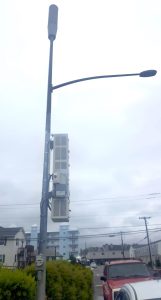 FCC small cell order imposes 60 and 90 day timelines for permit approvals, $500 cap on application fees, and $270 ceiling on recurring access and attachment fees over local authority.
FCC small cell order imposes 60 and 90 day timelines for permit approvals, $500 cap on application fees, and $270 ceiling on recurring access and attachment fees over local authority.
The Federal Communications Commission (FCC) voted 3-1 to approve an order restricting local governments authority over the deployment of small cells within the local rights of way. The order goes into effect 90 days after publication in the Federal Register.
Key Impacts on Local Governments
- Shorter “shot clocks” for permit approvals: 60 days for collocations on existing poles and 90 days on new poles.
- Caps on applications fees: $500 for a single application that includes up to 5 small cells. $100 for each additional small cell.
- Caps on rental rates: $270 per small cell per year for right of way access and attachment fees.
- Three-part test on aesthetic requirements: Preemption test hinges on what constitutes as “reasonable” aesthetic requirements.
The controversial order was opposed by local governments and organizations nationwide, including MACo, and may face petitions for a stay and lawsuits as Route Fifty reports:
All major state and local organizations opposed the measure, despite its anticipated approval, and are expected to petition the FCC for reconsideration—possibly followed by lawsuits, said Angelina Panettieri, principal associate for technology and communications at the National League of Cities.
…
Commissioners said localities will be granted leeway to update their procedures, but it is unclear whether that means an extension or a stay on the rule’s effective date—it generally takes a week to several months for the FCC to post final orders to the Federal Register.
The article notes opponents see the order as an overreach of authority, fear increased litigation over small cell deployments, argue that fee caps shortchange local governments, and believe that it will increase the digital divide in already unserved and underserved communities. On the other hand, proponents believe the order is necessary to streamline deployment and encourage investment in the emerging technology.
The order is modeled after legislation that has been enacted in 20 states nationwide. It does not preempt state laws that are more restrictive. MACo opposed legislation introduced last session in Maryland as it it significantly preempted local authority and had inequitable impacts on local communities. However, the hearing on the controversial bill was cancelled.
For more information:
FCC Approves New Rule To Limit Local Authority In 5G Rollout (Route Fifty)
Streamlining Deployment of Next Generation Wireless Infrastructure (FCC)
MACo Submits Concerns to FCC Over Small Cell Order (Conduit Street)
FCC Announces New Order to Guide Small Cell Deployment (Conduit Street)

